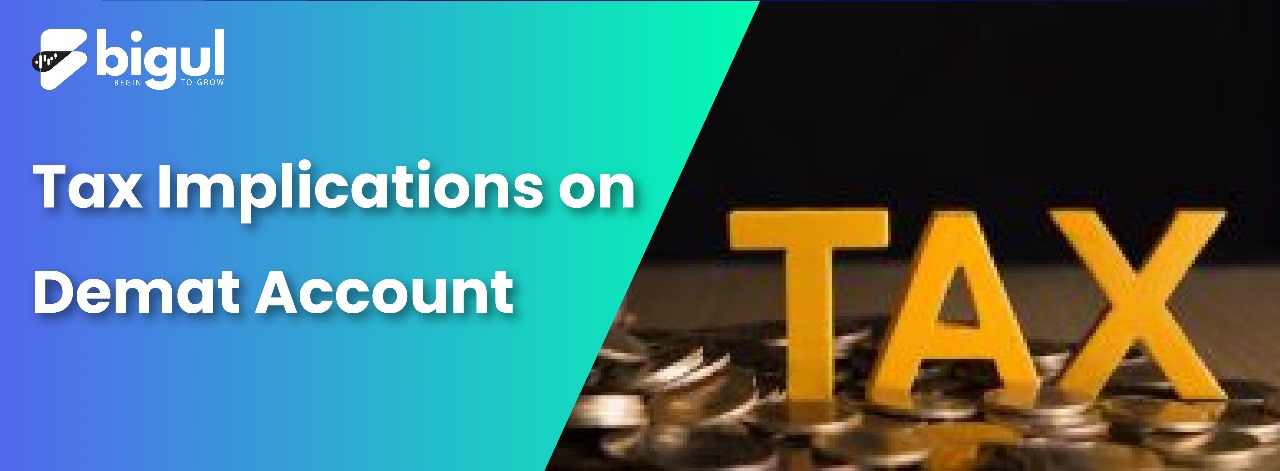Income tax on intraday trading is a critical aspect of the financial landscape. It is often confusing for traders and investors alike. Intraday trading involves buying and selling financial instruments within the same trading day, aiming to profit from short-term price fluctuations.
While the potential for substantial gains exists, understanding the tax implications is essential. The income generated from intraday trading is subject to taxation, and understanding the complexities of these tax regulations is crucial for traders to navigate the market successfully.
This article will explore the nuances of income tax on intraday trading, shedding light on its impact on traders’ financial strategies and obligations.
What is a Demat Account?
A Demat (Dematerialized) Account is a digital repository used in financial markets, primarily in countries like India, to hold and trade securities electronically.
It replaces physical share certificates with electronic records, enabling seamless and paperless buying, selling, and holding of stocks, bonds, and other financial instruments.
Demat accounts simplify stock trading and reduce the risk of loss or damage associated with physical certificates. Investors can access their holdings and execute transactions online, making it a fundamental tool for modern stock market participation.
What Are the Tax Implications on Demat Account?
Tax implications on a demat account in many countries can be complex and vary depending on the type of transactions and gains involved.
Here are some key tax considerations related to a demat account:
1. Capital Gains Tax
Capital gains tax is charged on the profit from selling demat account assets like equities or securities. The tax treatment of capital gains can vary based on the holding period of these assets:
- Short-Term Capital Gains (STCG): STCG is the profit from selling assets, like equities in a demat account, after the specified period. STCG is taxed at the individual’s income tax rate and is greater than long-term gains.
- Long-Term Capital Gains (LTCG): LTCG is the profit from selling assets like demat account’s stocks after the specified period. LTCG often enjoys favourable tax treatment, including lower tax rates or exemptions, encouraging long-term investment.
2. Securities Transaction Tax (STT)
STT applies to demat account securities purchases and sales. Traders and investors pay this tax at the time of the transaction. STT helps fund the government and stock market regulation.
The amount of STT depends on the type of transaction and the value of securities being traded and is an important cost consideration for traders in these regions.
3. Dividend Distribution Tax (DDT)
Dividend Distribution Tax is a tax imposed on the dividends received from shares held in a demat account.
While this doesn’t directly impact the holder of a Demat account, companies in India used to pay a dividend distribution tax on the dividends they distributed to shareholders. However, as of the financial year 2020-21, DDT has been abolished, and dividends are now taxed in the hands of the shareholders at their respective income tax rates.
The purpose of DDT is to ensure that tax is collected at the source, simplifying the taxation process for individual investors.
The specific rates and applicability of DDT can vary by country and are subject to local tax laws.
4. Tax Deducted at Source (TDS)
TDS means that when you sell securities and realize capital gains, the entity responsible for facilitating the transaction, typically your broker, deducts a certain percentage of tax at the source before transferring the sale proceeds to your demat account.
This TDS amount serves as a prepayment of your income tax liability. It ensures that the government collects taxes on capital gains in a timely manner.
Demat account holders need to consider this deduction when calculating their final tax liability and may claim credit for the TDS in their tax returns if applicable.
5. Goods and Services Tax (GST)
Specific charges imposed by depositories, registrars, and brokers in connection with demat account services attract GST. GST rates vary based on the service type and are added to transaction charges. Rates range from 18% to 28% in accordance with the relevant tax slabs.
It’s important for demat account holders to carefully examine their contract notes and statements from brokers to comprehend the GST component, ensuring adherence to tax regulations.
Tax Planning Strategies for Demat Accounts
Tax planning for demat accounts is crucial to optimize your returns and minimize your tax liabilities. Here are some tax-planning strategies to consider when managing your demat account in India:
1. Long-term Capital Gains (LTCG) Tax
Long-term capital gains (LTCG) from the sale of listed equity shares and equity-oriented mutual funds in India, as of 2023, tax-exempt up to Rs 1 lakh, with a 10% tax on gains exceeding that limit.
To minimize taxes, investors should consider holding these investments for over one year, as they qualify for this tax exemption. This makes it a strategic approach for tax planning in Demat accounts.
However, it’s important to verify the latest tax rules and rates as they may have changed since then.
2. Short-term Capital Gains (STCG) Tax
Short-term capital gains tax in India applies to profits from selling listed equity shares and equity-oriented mutual funds held for one year or less. Currently, the tax rate is 15%.
To minimize this tax liability, consider extending your holding period beyond one year or explore alternative investment options.
Keep in mind that tax laws may change, so stay updated on the current rates and rules.
3. Tax-saving Investments
Consider investing in tax-saving instruments like ELSS, mutual funds, PPF, NSC, and tax-saving fixed deposits to reduce taxable income. ELSS offers both tax benefits and potential capital growth, making it an attractive option.
These investments help you save taxes under specific sections of the Income Tax Act, providing deductions or exemptions that can lower your overall tax liability.
It’s essential to evaluate these options based on your financial goals and risk tolerance while considering their tax-saving benefits.
4. Dividend Distribution Tax (DDT)
DDT, which used to be levied on companies distributing dividends, has been abolished. Now, dividends are taxable in the hands of recipients. Plan your dividend income strategically after considering the new tax regime, to reduce your tax liability.
This change means that investors need to include dividend income while calculating their total taxable income, potentially affecting their overall tax planning strategies.
5. Offsetting Capital Gains
Offset capital gains by pairing them with capital losses from other investments. This strategy, known as tax loss harvesting, helps minimize taxable income. Adhere to tax laws and guidelines when executing this strategy to ensure compliance.
By strategically timing the sale of assets with gains and losses, you can potentially reduce your overall tax liability.
6. Use of Indexation
Indexation is a tax strategy that adjusts the purchase price of assets like debt mutual funds or bonds for inflation.
Inflation raises the cost price, reducing taxable capital gains when selling assets. This reduces investors’ tax liability, especially for long-term investments where inflation might significantly affect gains.
Impact of International Investments
In an increasingly globalized world, investors are no longer limited to domestic markets when building their portfolios. Indian investors now have the opportunity to diversify and expand their holdings by opening an account with an Indian broker partnered with a foreign broker.
While international investments offer a broader range of opportunities, they also come with specific tax implications that investors should be aware of:
1. Taxation of Foreign Securities in Demat Accounts
When Indian investors hold foreign securities in their Demat accounts, they must understand how these holdings are taxed.
Taxation of foreign securities in Demat accounts in India involves considerations related to capital gains, currency fluctuations, and the application of Double Taxation Avoidance Agreements (DTAA):
1. Capital Gains Tax
When Indian investors hold foreign securities in their Demat accounts, they are subject to capital gains tax.
Short-term gains, from selling within a year, face higher tax rates, while long-term gains, for holdings exceeding one year, enjoy lower tax rates and exemptions, often depending on Double Taxation Avoidance Agreements (DTAA).
Additionally, foreign currency fluctuations impact returns, as capital gains are calculated in foreign currency and converted to Indian Rupees upon repatriation.
2. Currency Fluctuations
Currency exchange rate fluctuations significantly affect the returns of foreign investments held in Demat accounts. When investors sell foreign securities, gains are initially calculated in the foreign currency of denomination.
Upon repatriation to India, these gains must be converted to Indian Rupees at the current exchange rate. Exchange rate fluctuations can increase or decrease returns on investment.
Therefore, investors must actively watch currency movements to gauge the true financial impact of their foreign holdings and make informed investment decisions.
3. Treaty Benefits
India has entered into Double Taxation Avoidance Agreements (DTAA) with numerous countries. DTAA aims to prevent double taxation of income in both the investor’s home country and the country where the income is generated. For investors in foreign securities, DTAA can have several implications:
- Reduced Withholding Tax Rates: DTAA often provides for reduced withholding tax rates on dividends, interest, and royalties earned from foreign securities. This can lead to higher after-tax returns for investors.
- Tax Credits: Under DTAA, investors can claim tax credits for taxes paid in the foreign country against their Indian tax liability. This helps prevent double taxation and can reduce the overall tax burden on international investments.
2. Double Taxation Avoidance Agreements (DTAA)
DTAA are bilateral pacts between India and other countries designed to prevent individuals or entities from being taxed twice on the same income.
These agreements facilitate cross-border investments by specifying which country has the primary right to tax various types of income, such as dividends, interest, and royalties.
DTAA provisions often include reduced withholding tax rates on such income, making international investments more attractive for Indian residents.
Additionally, DTAA allows taxpayers to claim foreign tax credits, offsetting taxes paid in one country against tax liabilities in another.
This not only prevents double taxation but also promotes economic cooperation and international trade by providing clarity on taxation matters and reducing the overall tax burden on cross-border income.
3. Reporting and Compliance
When it comes to international investments held in a Demat account, reporting and compliance are critical aspects that investors must adhere to.
These requirements ensure transparency and accountability in financial transactions and help the government track and regulate cross-border investments.
Here’s a detailed explanation of reporting and compliance considerations for international investments:
- Foreign Asset Disclosure: Indian residents must report foreign assets, including international investments in Demat accounts, when filing their income tax returns.
- FATCA (Foreign Account Tax Compliance Act): Compliance with FATCA may be necessary if the Demat account holder is a U.S. taxpayer or has significant U.S. ownership.
- CRS (Common Reporting Standard): India participates in CRS, which involves the automatic exchange of financial information with foreign tax authorities, necessitating accurate reporting.
- Penalties for Non-Compliance: Non-compliance with reporting obligations can lead to fines, interest on unpaid taxes, and legal repercussions.
- Professional Assistance: Seeking guidance from tax professionals or financial advisors with international expertise can help ensure proper compliance with cross-border investment regulations.
4. Exchange Control Regulations
Exchange control regulations, overseen by the Reserve Bank of India (RBI), govern the movement of funds related to foreign investments. These regulations dictate rules for remittances for international investments and the repatriation of funds from abroad.
Investors must adhere to RBI guidelines to ensure compliance with the law when conducting transactions involving foreign assets in their Demat accounts.
Violations may lead to legal consequences and financial penalties.
5. Currency Risks
Currency risks, also known as foreign exchange risks, refer to the potential financial impact of fluctuating exchange rates on international investments.
When investing in foreign securities through a Demat account, investors are exposed to the risk of their home currency weakening against the foreign currency.
If the domestic currency depreciates, it can lead to lower returns when converting foreign investment gains back into the home currency.
Conversely, a stronger home currency can enhance returns. Managing currency risks is crucial for international investors to protect their investment values and maximize overall portfolio returns.
Reporting and Compliance of Demat Account
Demat accounts, which hold securities in electronic form, are an essential component of the modern investment landscape in India.
While they offer convenience and security for investors, it’s crucial to understand the reporting and compliance requirements associated with these accounts. This ensures that investors remain compliant with the regulatory framework and tax laws of the country.
Here’s an overview of reporting and compliance related to Demat accounts:
1. Filing of Income Tax Returns
Demat account holders in India must fulfill a critical compliance requirement by regularly filing their income tax returns. This process involves reporting any income earned from securities within the Demat account, including capital gains, dividends, and interest income.
The accurate reporting of these earnings is essential for tax compliance. To do this, individuals must use the appropriate income tax return forms, such as ITR-2, ITR-3, or ITR-4, based on their specific sources of income and financial circumstances.
Filing income tax returns ensures that taxpayers fulfill their legal obligations and helps in maintaining financial transparency.
2. Reporting Demat Account Holdings
Investors must provide a comprehensive account of their Demat holdings in their income tax returns. This includes disclosing the types and quantities of securities held, along with their respective market values.
Accurate reporting is essential to ensure compliance with tax regulations and helps tax authorities monitor and verify an individual’s financial assets.
Proper reporting of Demat holdings ensures transparency and accountability in an investor’s financial dealings and helps them meet their tax obligations efficiently.
3. Capital Gains Reporting
Investors using Demat accounts must report any capital gains resulting from selling securities in their income tax returns.
This includes both STCG and long-term LTCG capital gains. Details of each transaction, such as purchase and sale dates, prices, and capital gain amounts, should be accurately documented and reported in tax filings.
Proper reporting ensures compliance with tax regulations and helps calculate the tax liability associated with capital gains.
4. Dividend Income Reporting
Dividend income earned from securities held in a Demat account must be accurately reported in the income tax return. While dividend income from domestic companies is often tax-free up to a specified limit, it should still be disclosed in the appropriate section of the income tax return form.
Investors should provide details of the dividends received during the financial year, ensuring compliance with tax regulations.
5. Securities Transaction Tax (STT) Reporting
Securities Transaction Tax is a tax levied on the sale of securities on recognized stock exchanges in India. While Demat account holders are not responsible for directly paying STT, they should be aware of it. Typically, brokers deduct STT during transactions.
Demat account holders should maintain records of STT payments, as this information may be needed for tax reporting purposes.
STT reporting is important for accurate tax compliance and helps in calculating capital gains accurately when filing income tax returns. Failure to consider STT in tax reporting could result in errors and potential penalties.
6. Penalties for Non-compliance
Failing to meet the reporting and tax obligations associated with Demat accounts can result in severe consequences. Non-compliance may trigger official notices from tax authorities, who may subsequently conduct tax assessments.
Depending on the extent of the violation, investors may face penalties and fines. It is crucial for Demat account holders to remain vigilant, fulfill their tax obligations, and keep accurate records to avoid these penalties and legal repercussions.
This ultimately safeguard their financial interests and maintain their compliance with the tax laws and regulations in India.
Strategies for Tax Efficiency
In the context of taxation on Demat accounts in India, understanding and implementing tax-efficient strategies can significantly impact an investor’s financial outcomes.
Here, we delve into various strategies for tax efficiency:
- Long-term Holding: Hold investments for more than one year to qualify for lower long-term capital gains (LTCG) tax rates.
- Indexation Benefit: Utilize indexation to adjust the purchase price for inflation when calculating LTCG on debt investments like bonds or debt mutual funds.
- Tax-saving Instruments: Invest in tax-saving instruments like ELSS and PPF to benefit from Section 80C deductions.
- Dividend Reinvestment: Reinvest dividends rather than taking them in cash to defer taxation.
- Strategic Asset Allocation: Allocate assets wisely, placing higher-growth assets in tax-efficient accounts (e.g., equity) and income-generating assets in tax-deferred accounts (e.g., PPF) to optimize tax efficiency.
Conclusion
Understanding the tax implications on a Demat account in India is crucial for every investor.
While the account itself is not subject to direct taxation, gains and losses from the buying and selling of securities within it have varying tax treatments, including capital gains tax and securities transaction tax. Additionally, dividends and interest income earned may also have tax liabilities.
Staying informed about these regulations and seeking professional advice when needed is essential for efficient tax planning and compliance, ensuring that one can make the most of their investments while staying on the right side of the law.
FAQs
Are there any taxes associated with opening a Demat account in India?
No, there are no taxes specifically for opening a Demat account in India. However, you may incur charges related to account maintenance and transactions.
Do I need to pay taxes on dividends received in my Demat account?
Yes, dividends earned from stocks held in your Demat account are taxable. They are subject to Dividend Distribution Tax (DDT) in the hands of the company or Mutual Fund, and you may also need to pay additional taxes on the dividend income received.
Can I save on taxes by trading in the Equity Derivative segment through my Demat account?
Equity Derivative trading is subject to taxes like Securities Transaction Tax (STT), and any profits or losses incurred are included in your overall income for tax calculation. You should consult a tax advisor to understand the implications.







.jpg)
.jpg)
